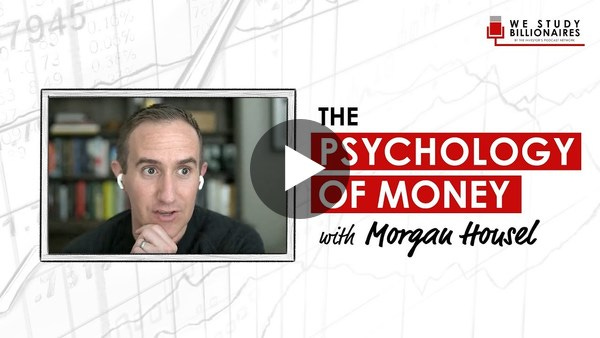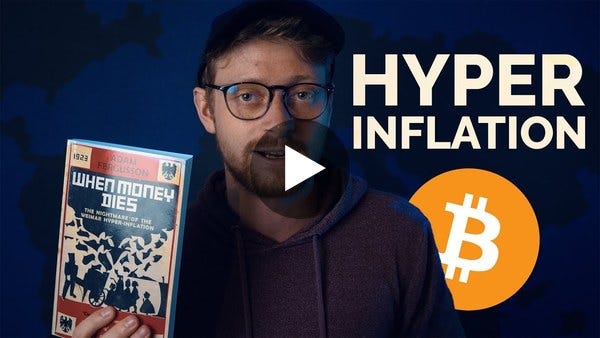The 6 best books on money, investing and personal finance
Looking for some good books on money and personal finance for the holiday season? Here is my selection of 6 of the best on this topic.
The Psychology of Money - Morgan Housel
Recommending this one is a no-brainer. It’s an effortless read, and it’s packed with aha-moments, clever storytelling and memorable quotes. As the title suggests, Housel focuses on the behavioural finance aspects of money and investing. In other words, he tries to figure out why some decisions may seem irrational but make sense when you look at them from a psychological, personal level. The book is structured in 20 short chapters, each with a different focus and unique take-away. A lot of it may seem too basic to matter, but that’s precisely why it’s so important to remind yourself about the basics again and again.
My key learning from “The Psychology of Money” is that everyone’s life is different. Therefore there is no right or wrong when it comes to money and investing. Sure, you should lower your time preference, save more than you spend, and don’t let your ego take the steering wheel. But as Housel writes at the end of the book:
“Smart, informed, and reasonable people can disagree in finance, because people have vastly different goals and desires. There is no single right answer; just the answer that works for you.”
Here’s a recent podcast with Morgan Housel where he talks about the key topics of his book:
TIP351: The Psychology Of Money W/ Morgan Housel
The Ascent of Money - Niall Ferguson
I read this book a couple of years ago for the first time. I think it’s an excellent introduction to where money and currency come from, why capitalism produces booms and busts, how the world transitioned from a gold standard to fiat currencies and why our current inflationary financial system is destined to collapse eventually.
“The rewards for ‘getting it’ have never been so immense. And the penalties for financial ignorance have never been so stiff.”
I own one of the first editions, published in 2009. So there are no mentions of newer phenomenons like Bitcoin, CBDCs or DeFi.
For Niall Ferguson’s more recent takes on money, Bitcoin and the world economy, check this podcast (start at around one hour in):
Niall Ferguson: History of Money, Power, War, and Truth | Lex Fridman Podcast #239
When Money Dies - Adam Fergusson
This one is somewhat of a classic among Bitcoiners and people sceptical of the current Quantitative Easing aka money printing that was already happening around the world Pre-Corona and is now went into full throttle mode.
“When Money Dies” (released in 1975) is a cautionary tale of the Weimar Hyperinflation when in 1923, the Weimar Republic regressed to a barter economy because marks, the local currency, became worthless. It depicts the events that eventually played an essential role in the rise of Nazism in Germany from a series of personal stories and experiences.
“We used to say ‘The dollar is going up again’, while in reality the dollar remained stable but our mark was falling.”
Here’s an excellent video summarizing the main ideas of the book:
The Weimar Hyperinflation & Parallels to Today - When Money Dies | Bitcoin as an Inflation Hedge
Naked Money - Charles Wheelan
I like Charles Wheelan’s approach to storytelling. He’s a master at explaining complex, dry topics in a straightforward, digestible way. I’ve read his book Naked Statistics at uni, and I also liked his book Naked Economics.
Naked Money is similar to the two aforementioned but focuses solely on money and the current financial system. He covers the American monetary history, similarities between the financial crashes of 1929 and 2008, Japan, the euro, the US and China, and the future of money.
Especially this last chapter is exciting, as Wheelan is a sceptic and not a Bitcoin evangelist, and I always find the perspectives of those people most interesting. Of course, he’s listing a couple of common reasons why Bitcoin will never become a mainstream payment method or “real” money: too volatile, challenging to self-custody, mainly used for illegal transactions. He even grades Bitcoin based on his analysis: Unit of account = F; Store of value = D; Medium of Exchange = C (B+ if you are in a country where the currency is falling apart, and A+ if you are a terrorist, arms or drug-dealer or kidnapper).
“It (Bitcoin) is a historical record of transactions made possible by the Internet, clever programming, powerful cryptography, and the willingness of entrepreneurs, speculators, libertarians, and others to trade money that doesn’t have the legal backing of a government. (…) Even Bitcoin’s detractors, who include just about every serious person I’ve ever spoken to on the subject, see value in this technology.”
Extreme Economies - Richard Davies
A unique, exciting book I picked up at a book store last year or so. The author travelled to 9 different regions/cities and clustered them into three sections (Survival, Failure and Future). So, for example, he visits disaster-stricken Aceh, Indonesia, to see how people build up their town after a deadly tsunami. Or Kinshasa, the capital of the Democratic Republic of Congo, which should be Africa’s best megacity but turned out to be one of the poorest cities on the planet. And he visits cities that show is our future: Japan’s Akita with its ageing population; Estonia’s Tallinn that is a tech early-adopter and Chile’s Santiago, which is home to extreme inequalities.
“In places of extreme stress and change, the role social capital plays is crystal clear. It is a glue that binds a society’s other assets together, squeezing more out of them.”
How I Invest My Money - Brown, Portnoy
The last book in this list is again a pretty unique take on money, personal finance and investing. “How I Invest my Money” is exactly what the title promises: 25 people give very brief and easy-to-read overviews on how they save and invest money. Morgan Housel, who wrote the first book on this list, is one of them. For him, independence is the most crucial asset he wants to have; that’s why he’s holding a lot of cash, so he can completely change his life and start working in a different industry if he decides to do so. Others recommend that you should invest in yourself or that you should only invest in things you genuinely feel passionate about. Given that most people featured in the book are professionally managing money and therefore have quite a lot of it, most say that their best investments so far have been smaller seed investments in early-stage companies or general private equity. That’s a bit unhelpful for regular people, but it’s still a great book.
“I’m very excited to share the perspectives and personal stories we’ve collected for this book from some of the best writers and communicators in the investment business.”
Like what you read? Subscribe and follow me on Twitter.
Photo by yours truly.







